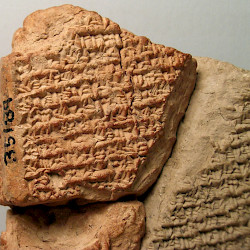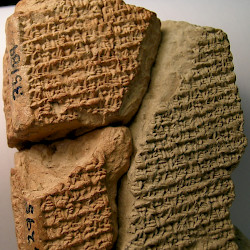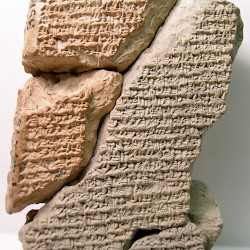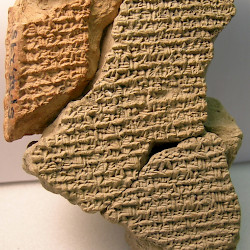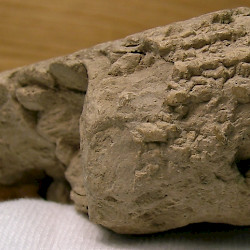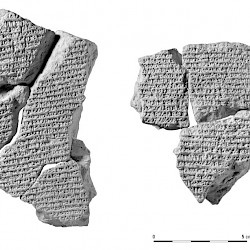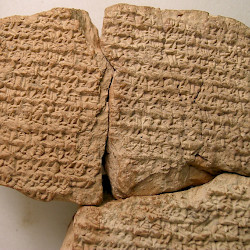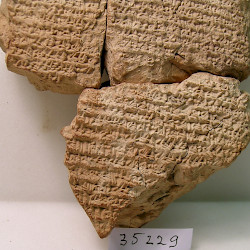BCHP 18B/A Chronographic Document Concerning Bagayasha B/A
The Chronographic Document concerning Bagayasha (BCHP 18B/A) is a Mesopotamian historiographical text written in ancient Babylonia in the Hellenistic Period. It describes a punitive action by the Parthian prince Bagayasha (the future king Arsaces VIII Bagases) against the city of Babylon.

The Chronographic Document concerning Bagayasha (BCHP 18) is a Mesopotamian historiographical text written in ancient Babylonia in the Hellenistic Period. The cuneiform tablets in the British Museum seem to belong to two documents. On this webpage, a new reading is proposed of the first of these, which describes a punitive action by the Parthian prince Bagayasha (the future king Arsaces VIII Bagases) against the city of Babylon. This document consists of
- Text B (left part of the original tablet): BM 35189 + 46018 + 46216 (= Sp. III, 295+81-7-6,464+81-7-6,678)
- Text A (right part of the original tablet): BM 35229 + 35518 + 35621 (= Sp. II 792 + Sp. III 24+27)
The second document will be dealt with here. The official publication will be in I.L. Finkel, R.J. van der Spek, R. Pirngruber, Babylonian Chronographic Texts from the Hellenistic Period (2020; = BCHP; Writings of the Ancient World).
Description of the tablet
The original tablet has been broken into many pieces, of which seven have been identified and joined by Irving Finkel, so that we have now two fragments which probably belong to the same tablet in view of content and script. The two fragments do not join.
- A: Length: 8.5 cm, width: 7 cm (at line 4), thickness 3 cm.
- B: Length: 12.5 cm., width 7 cm (written line 8: 6 cm), thickness left edge 3 cm, right edge 3.5 cm. The bottom edge (3 cm. actually the upper edge of the original tablet) is partly preserved and inscribed. Seven so-called “firing holes” (the purpose of which is unknown) are preserved on the left edge. A few traces of cuneiform signs are preserved on the reverse of Sp III 295 = BM 35189.

In our earlier edition (2006) we assumed that Text A was the upper right part of the tablet and B the lower left part. Meanwhile we have changed our minds. In view of the content it is highly probable that lines B 8’- 34’ correspond with lines A 1’-27’. In between an unknown part of the tablet is lost.
If this is correct, then we have to assume that the tablet was rather wide, at least about 20 cm, hence about 7 cm. missing in the middle. Astronomical Diaries of this size are exceptional, but they exist.note
What we now have is the lower part of the reverse side of the original tablet. This is proven by the fact that we have the colophon on the left edge and these colophons are always written with the obverse (the flat side) down and the reverse up, as is the case here. This observation suggests that we have here the historical part of an astronomical diary. The obverse and the upper part of the reverse must have contained astronomical observations. Although no astronomical information remains, the tablet looks in fact like an astronomical diary rather than a chronicle. The tablet has so-called firing holes on the left edge of the tablet, which is common in diaries, not in chronicles. More important: the colophon on the left edge of fragment B seems to say that it was a diary.
Previous publication
R.J. van der Spek, ‘The Size and Significance of the Babylonian Temples under the Successors,’ in: P. Briant, F. Joannès eds., La Transition entre l’empire achéménide et les royaumes hellénistiques (vers 350-300 av. J.-C.) (2006) 261-307, Appendix 2, text 1, pp. 284-288 (lines A 4’-7’; 19’-22’; B 2’-9’; 17’-23’; 28’-31’).
Summary
The following appears to be reasonably clear:
- B1'-11': Bagayasha arrives in Babylon for a punitive action and asks account of the peliganes (council of elders). The generals are present, mention is made of plundering, politai, and “people who live in the palace” (perhaps people had fled into the palace or are captured in the palace). People leave their houses. It must have been a gruesome situation.
- 12'-18': Mourning and supplications. Babylonians, people of the land, women, the šatammu of Esagila, slaves of the king, a few politai, the governor (pāhatu = epistates) wear mourning. The people who are in the palace raise a cry of distress. It seems as if they have acted treacherously, but have changed their intentions, and are now set free. Perhaps their request is that the plundering soldiers go back to their garrison.
- 18'-25': PN-xx-nu, possibly the son of Bagayasha and maybe a military commander, intercedes. Many offerings and valuables are presented. Joy of heart in the land. PN-xx-nu leaves to his camp.
- 26': The šatammu with five Babylonians and the pahatu are summoned. PN-xx-nu returns; politai are brought back.
- 26'- 27': The general (= PN-xx-nu?) makes Parthian troops enter the garrison. Twenty brought-in people are deported and he takes the road to the city of Sha-pi-Adad.
- 27'-28': DAY 10: The general (strategos) of Babylonia assembles the Parthian troops of the garrison. At the command of Bagayasha they go out. The people of the land and the people who live in the palace leave for an unidentified place.
- 29'-31': DAY 11: Bagayasha enters Borsippa. The šatammu of Ezida provides offering animals and makes offerings for Nabû and Nanaia. Some decision is taken as regards the silver of the temple of the gods of Sha-pi-Adad. The prince leaves Borsippa.
- 33'-end: PN-Nabium (??) arrives. Long report about fighting. Conquest of “that city” (Sha-pi-Adad?).
It is hard to understand what has going on over here, but it seems that Babylon has acted treacherously, is looted, but ultimately pardoned.
Note
In the transcription two dots (..) is the approximation of one missing sign, apart from the lost middle part of ca 8-10 signs, which we indicated as (///).
Reverse
[B1'] [.. .. .. .. befo]re him they went .. .. .. .. .. .. .. .. .. .. .. .. (///)
[B2'] /That month?\ [B]agayasha, the p[rince?, into Babylon arrived .. .. .. .. .. .. (///)
[B3'] their /accounts(assets)??\ the peliganes [.. .. .. .. .. .. .. .. .. (///)
[B4'] these generals returned hither and from Babyl[on .. .. .. .. .. .. .. (///)
[B5'] he made captives from him and he plundered from him and .. [.. .. .. .. .. (///)
[B6'] and these people, who l[ive] in the royal palaces [.. .. .. .. .. ..] x [.. .. (///)
[B7'] the politai and these troops [.. .. .. .. .. .. sp]okepl? to [(///)
[B8'=A1'] aforementioned retreatedpl/defeatedpl. <The people>, great and small, x [.. .. .. .. ..] He stood by watching the battle [(///)] ...
[B9'=A2'] this prince became angry and x[.. .. .. .. .. ..]x in the totality of his army [he] s[poke? (///) ] x x [.. .. .. ..] x x x x x x x x x x x x x [.. .. .. ..]
[B10'=A3'] in order to rob the ruin and to plunder [.. .. .. .. .. .. .. ..] he ordered to enter.? .. [(///)] x x x he spoke. To? x[.. .. in ] the afternoon at the appointed time he took (it) away from them. The troops, the weapons? [.. .. ..]
[B11'=A4'] the city of Na?-du?-mar?-bi of the land of M[edia? .. .. .. .] Usursudi? x[(///) all [the peop]le of the land relinquished their houses and their belongings. All of them wen[t out (.. ..)]
[B12'=A5'] [.. .. .. .. .. .. .. ..] x x [.. .. they list]ened and they mourned x[(///)]x in order to save the x[.. ..]s, the captive? and the sold? women? x(x)[ .. .. .. ..]
[B13'=A6'] [.. .. .. .. .. .. .. .. .. .. .. .. the] Babylonians and numerous people of the land, wom[en? (///) the ša]tammu of Esagila, the Babylonians, the slaves of the king, a few people from among the pol[itai]
[B14'=A7'] [.. .. .. .. .. .. .. .. the politai?] and the governor (pahat) of Babylon, wearing mourning, [(///)] these [pe]ople, who [li]ve in the royal palaces, all of them [raised?] a cry of distress, a clamor? .. .. .. .. .. [.. .. .. ..]
[B15'=A8'] [.. .. .. ..]x in wail[ing heavil]y they have mourned. From the rising of the [sun (///)] to all the people in .. [.. .. ..] .. they supplicated as follows: “The doors x [may be opened;]
[B16'=A9'] [int]o the garrison of the king [ .. .. ..] you have to enter!” The city, the temples and the people and x [..(///) their mind]s they changed. With? their former (labirišunuB17’) bad intention, treacherous talk, words of good? help? [.. ..]
[B17'=A10'] they s[poke?], now indeed a good intention, a good speech, a ri[ghteous] word [..(///) the people who are with]in the palace spoke. The gates? of the palace he unlocked and the governor (šaknu) providedB18’ 10 fat[tened] geese [at the gate?]
[B18'=A11'] of this palace for the wailing (ritual) (?). The šatammu of Esagila (and) the [Babylon]ians? [(///) to?] the prince? aforementioned he spoke. That d[ay PN-]x-’?-nu, who was with him, to the prince aforementioned one fat[tened] ox [and]
[B19'=A12'] 3 [fat] sheep for off[ering]s and x fattened ducks [ .. .. (///) ] x silver, weighing 40 pounds, [.. ..]x of gold within? 5? x x of? x x [.. ..].
[B20'=A13'] Joy of heart was established in the land and among the people. The captured? and sold? women? [.. .. (///) ] he and his generals with him x[.. .. ..].. ..[.. .. .. .. .. .. .. .. .. .. .. ..]
[B21'=A14'] they performed? in the Greek fa[shio]n, which for the king x [.. .. .. .. (///) one ox and] 4? fattened sheep for the sheep offering x [.. ..] /x x\[.. .. .. .. x of]fering shee[p .. ..]
[B22'=A15'] as a food offering for Bel they [provid]ed before him at the Sikilla Gate, the [great] Gate [of Esagila (///)] x before the statue of the king which/of x [.. .. .. .. .. .. .. .. .. of]ferings in the [Greek?] fashion
[B23'=A16'] x x [.. .. ..] the Sikilla [G]ate, the Great Gate of Esagila x [.. .. .. .. .. (///).. .. ..] x x [.. .. .. .. .. ..] fattened offering sheep which the šatammu of Esagila /had pro\[vided?]
[B24'=A17'] [.. .. .. ..]in the aforementioned place a food offering for Bel and Beltia, the [great] gods [ .. .. .. (///).. .. .. .. .. ..] x x x, the Babylonian, a golden crown, golden weapons? of Bel[.. .. .. ..]
[B25'=A18'] [nume]rous? [.. ..] on his knees he bound him. To the side of [.. .. .. .. .. (///) .. .. .. .. .. .. PN-xx]x’anu, made/performed. That day from Babylon he went out to his camp.
[B26'=A19'] [The š]atammu of Esagila, five Babylonians, the epistates of Babylon, five [politai, .. .. (///).. .. .. .. .. ..] returnedsg. The politai, who are in Babylon, he brought back (GUR-ra). The troops of Subartu [(.. ..)]
[B27'=A20'] [in]to the garrison he made them enter with him. 20 brought-in people he deported [.. .. (///).. .. .. .. .. to the city of Š]a-pi-Adad he took the road. On the 10th day, the general (strategos) of Babylonia [(.. ..)]
[B28'=A21'] [the S]ubarian troops of the garrison in great numb[er .. ..] x x x [.. .. .. (///).. .. .. .. .. ..] Bagayasha – they went out. The 9th day and the 10th day, the people of the la[nd and the people]
[B29'=A22'] [who] live in the royal palace, went into x (?). Day 11t[h, the prince entered Borsippa … (///).. .. .. .. the šata]mmu of Ezida and the Borsippaeans 1 ox and [3? offering]sh[eep]
[B30'=A23'] [for the prince af]orementioned established for him. For Nabu and Nanaia he (= the prince) performed them. [.. .. (///) .. .. .. .. .. .. s]ilver of the temples of the city of Ša-pi-Ad[ad .. .. .. .. .. .. .. .. .. .. ..]
[B31'=A24'] [..] /to\ the goddesses Ekurritu, Esurritu and the city gods of the city of Ša-p[i-Adad (///).. .. .. .. .. ..] the prince from Borsippa wentsg out(?) [.. .. .. .. .. .. .. .. .. .. .. ..]
[B32'=A25'] [.. .. ..]PNx-Nabû?, who concerning his son to Borsippa, had been called [.. (///) .. .. .. .. .. .. ..] .. .. against him .. [.. .. .. .. .. .. .. .. .. .. .. ..]
[B33'=A26'] [.. .. .. ..] .. he in order to levy his troops from? .. .. .. [.. (///) .. .. .. .. .. .. .. ..] x x to Babylon [.. .. .. .. .. .. .. .. .. .. .. ..]
[B34'=A27'] [.. .. .. .. ..]x .. .. .. battering rams and ba[ttle] equipment [.. (///) .. .. .. .. .. .. .. ..] x x [ .. .. .. .. .. .. .. .. .. .. .. .. .. .. .. .. ..]
[B35'] [.. .. with siege lad]der(s)? he defeated that city and the troops x[ (///)
[B36'] [.. .. .. .. .. .. ..ho]rses, cattle and ewes in great number as booty [(///)
[B37'] [.. .. .. .. .. .. .. .. .. .. ..] x x x fetters? cita[dels? (///)
[B38'] [.. .. .. .. .. .. .. .. .. .. .. .. .. .. ..] x x .. aforementioned [.. .. (///)
Lower edge
[B39'] [.. .. .. .. .. .. .. .. .. .. .. .. .. .. .. .. ]x troops of the king x[ (///)
[B40'] [.. .. .. .. .. .. .. .. .. .. .. .. .. .. .. .. ]x x x x x[ (///)
[B41'] [.. .. .. .. .. .. .. .. .. .. .. .. .. .. .. .. ..] all the people [ (///)
[B42'] [.. .. .. .. .. .. .. .. .. .. .. .. .. .. .. .. ..] x troops? x x[ (///)
[B43'] [.. .. .. .. .. .. .. .. .. .. .. .. .. .. .. .. ..] god? x x [ (///)
[B44'] [.. .. .. .. .. .. .. .. .. .. .. .. .. .. .. .. ..]x x .. x [ (///)
Left edge
[B45'] [......] x x x troops x x x x [.. .. .. ]day nth? until? day 26th [(…)]
[B46'] [Regular observations of year x month y Arsac]es king.
